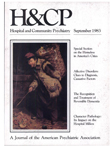Reversible Dementia and the Misdiagnosis of Dementia: A Review
Abstract
Ten to 33 percent of the patients who present for evaluation of dementia are found to have a potentially reversible cause of dementia such as a metabolic, structural, or psychiatric condition. Another group of patients who present with symptoms or complaints of impaired thinking are erroneously diagnosed as suffering from dementia. The author reviews the criteria for diagnosis of dementia, the laboratory and other tests advisable for use in evaluating the presence of dementia or guiding the treatment of irreversible dementia, and some factors that may lead to the misdiagnosis of dementia. He emphasizes that a thorough medical, psychiatric, and psychosocial evaluation of all patients presenting with cognitive impairments is essential.
Access content
To read the fulltext, please use one of the options below to sign in or purchase access.- Personal login
- Institutional Login
- Sign in via OpenAthens
- Register for access
-
Please login/register if you wish to pair your device and check access availability.
Not a subscriber?
PsychiatryOnline subscription options offer access to the DSM-5 library, books, journals, CME, and patient resources. This all-in-one virtual library provides psychiatrists and mental health professionals with key resources for diagnosis, treatment, research, and professional development.
Need more help? PsychiatryOnline Customer Service may be reached by emailing [email protected] or by calling 800-368-5777 (in the U.S.) or 703-907-7322 (outside the U.S.).



